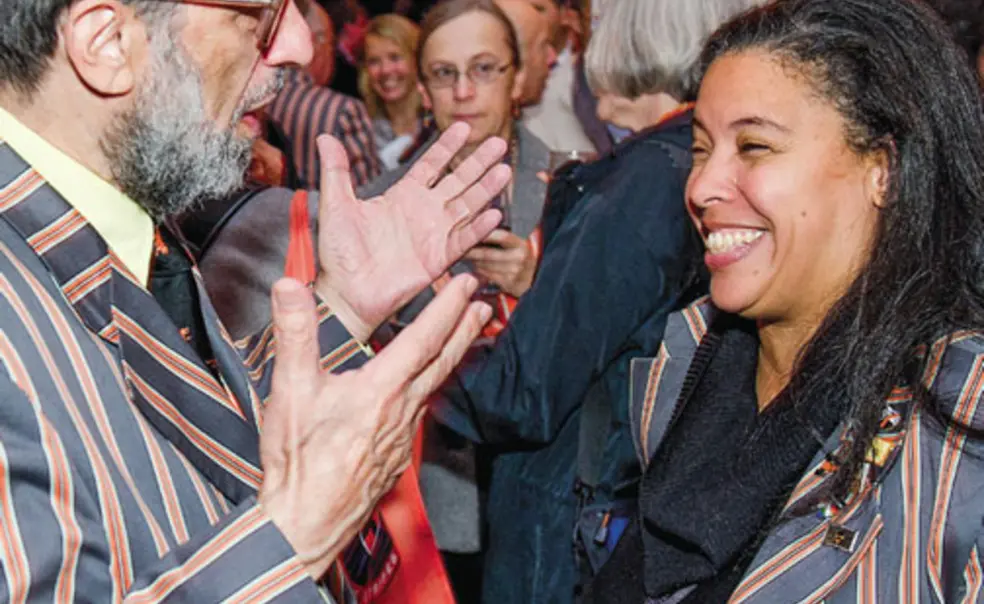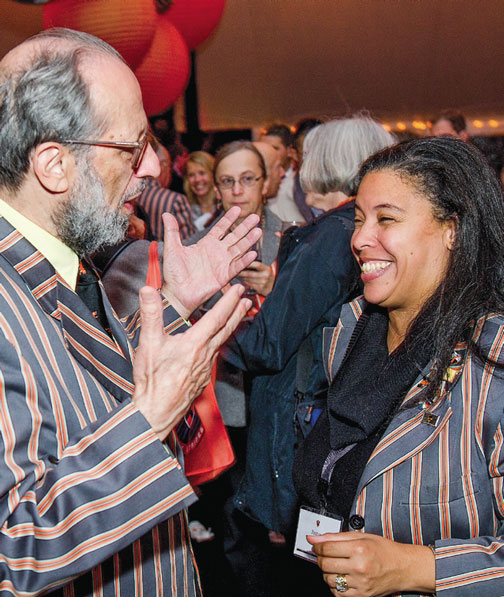Honoring the ‘Dog Days’ and Celebrating Graduate Alumni
At Princeton’s recent graduate alumni conference, I heard attendees speak vividly about how grueling and isolating the graduate student experience can be. I also heard profound expressions of warmth and gratitude toward the University — from those same people.
The “Many Minds, Many Stripes” conference in October brought to campus an inspiring group of graduate alumni spanning generations, fields of study, and professional pursuits. Spending time with them and hearing their stories reinforced my view that we must do more to embrace graduate students and graduate alumni as core members of the Princeton family.
Graduate students are, of course, fundamental to Princeton’s mission as a liberal arts college and a world-class research institution. They are dedicated teachers and mentors to undergraduates and invaluable partners to faculty in creating new knowledge. They are an important source of fresh intellectual energy, and they are destined to become the next generation of leaders in their disciplines. But, historically, many graduate students and alumni have not felt like valued members of a University community renowned for its distinctive commitment to undergraduate education.
Take, for example, the singing of our alma mater — a quintessential ritual for undergraduate students and alumni. Anthony Fiori *03 told me he never sang “Old Nassau” until he joined the Association of Princeton Graduate Alumni, of which he now serves as president. Similarly, the columnist and author George Will *68 said during his conference dinner remarks that not only did he never sing “Old Nassau” as a graduate student, he never even heard it sung until he joined the Board of Trustees some 40 years after he completed his Ph.D.
Our new provost, David S. Lee *99, exemplifies the dichotomy of the Princeton graduate student experience. In his conference remarks, David confessed that as a graduate student he felt like “the neglected, middle child of the Princeton family … who laments living in central New Jersey, eating Hoagie Haven dinners on makeshift dining tables made of large cardboard boxes, [and] spending every waking hour in a cage-like carrel in Firestone Library.”
Yet, David stressed that he feels “a much stronger connection to Princeton than I do to my undergraduate alma mater, Harvard, which I think of today mostly as the place that gave me the opportunity to have a life-changing experience as a graduate student at Princeton.” Pursuing his scholarly passions in close collaboration with distinguished faculty was, despite the hardships, “both exciting and a special privilege.”
Such sentiment was shared by many of his fellow graduate alumni. You could even hear it reflected in the soundtrack to the slideshow presented at the conference’s closing reception. As each image of smiling attendees faded into the next, tunes such as Florence and the Machine’s “Dog Days are Over” and the Beatles’ “Here Comes the Sun” paid homage to those who endured the graduate school grind and emerged ready to make a difference in the world.
Thankfully, judging from the enthusiastic turnout at “Many Minds” — some 950 graduate alumni and guests — as well as efforts over the past decade to enhance graduate student life at Princeton, we are seeing positive trends in strengthening graduate student and alumni bonds with the University.
Initiatives to enrich the graduate student experience have included improving the academic curriculum, expanding professional development programming, boosting support for graduate students with families, integrating graduate students into the residential college system, and building the new Lakeside complex to sustain the University’s commitment to graduate housing. And graduate alumni engagement with the University community is growing. More than 100 graduate alumni serve in leadership positions in regional alumni associations worldwide, and more than 1,000 graduate alumni have interviewed prospective undergraduates for the Alumni Schools Committee in recent years — playing an important role in shaping Princeton’s future.
I hope we will continue to see more graduate alumni coming back to campus for major events such as Reunions and Alumni Day, participating in regional alumni association events, and engaging in volunteer activities. I am also excited about the Alumni Association’s collaboration with academic departments to organize more departmental gatherings for graduate alumni on and off campus.
Forging bonds with our graduate alumni — many of whom serve as faculty and administrators at institutions worldwide — is important not only for Princeton, but for our work with the broader higher education community as well. Princeton is committed to leading the charge to support higher education against today’s political and financial challenges, and stronger ties to our graduate alumni community will help us cultivate the partnerships and creativity needed to keep up this fight.
The “Many Minds” conference was a great success in showing how much the University cares about graduate alumni, and it was wonderful to see so many attendees embrace the orange and black. I hope all graduate alumni will find some way to share in the spirit that was celebrated at this event — and to recognize that the star after their names is the mark of a true Princetonian.














No responses yet